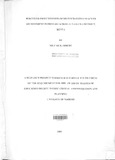| dc.description.abstract | The rapid expansion of the education sector in Kenya and lack of policy
reviews has led to ineffective and inefficient delivery of services resulting in
inequitable distribution and wastage of teachers. In order to alleviate this problem
of inequitable distribution and wastage of teachers, TSC decided to have the
districts to do teacher recruitment through a demand-driven process that started in
2001.
However, the Decentralized Teacher Recruitment has been perceived as
ineffective by the stakeholders due to abuses perpetuated by TSC agents. The
stakeholders argue that the recruitment process is marred by malpractices and
irregularities including, corruption /bribery, tribalism, nepotism/ favouritism,
disregard of the guideline given by TSC, and political interference in the
recruitment process.
The literature review was carried out under the themes, the concept of
perception, the concept of decentralization, factors that affect the implementation
of decentralization, teacher recruitment abroad, and decentralization of teacher
recruitment in Kenya The study used descriptive methods in both data collection and data
analysis. Sampling was done using a multistage random method and a
questionnaire was used to collect data from 103 teachers out of 120 (86%) in 20
primary schools in Gucha District. Data analysis and interpretation was done
manually using frequency tables, pie charts, bar charts and percentages
The study found that generally the teachers perceived the Decentralized
Teacher Recruitment differently. There were both positive and negative
perceptions by the teachers. The key positive findings included: equitable
distribution of teachers in the country as a whole and in the districts in particular
and opportunities for employment for local candidates hence reducing transfer
requests. The negative perceptions included discrimination of non-local
candidates, manipulation leading to irregularities and political interference. The
teachers also expressed that stakeholders should be sensitized to create better
understanding and perception of the exercise and involved in decision making to
enhance acceptance of the Decentralized teacher recruitment.
The study recommends that:
• Stakeholders be sensitized on the new policy of Decentralized Teacher
Recruitment
• Changes of policy on Teacher Recruitment be communicated to stakeholders
who should also be involved in decision making on the same
• The TSC should monitor the Decentralized Teacher Recruitment process to
ensure that the guidelines are adhered to, and specifically ensure that:
o The recruitment panel co-opt religious persons (pastors or priests) who
will not be compromised or manipulated;
o The TSC deals with the problem of malpractices;
o The TSC discourages political interference with the recruitment
process
Taking into account that the study was delimited to Gucha district, the
study made the following suggestions for further study:
• A similar study to be carried out in other districts of the country in order to
elicit a more accurate national perception of the effectiveness of Decentralized
Teacher Recruitment.
• A study to be carried out on the impact of Decentralized Teacher Recruitment
on the standards and quality of education | en |

